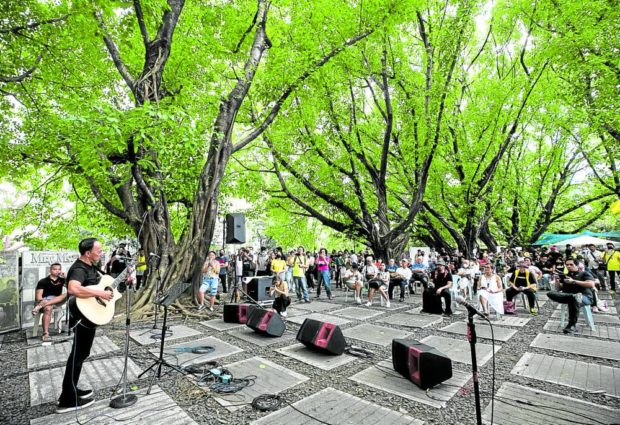
SONGS OF FREEDOM | The commemoration of the Edsa People Power Revolution at Bantayog ng mga Bayani in Quezon City on Saturday includes a performance by activist-singer Noel Cabangon to celebrate the ouster of dictator Ferdinand Marcos in 1986. (Photo by LYN RILLON / Philippine Daily Inquirer)
MANILA, Philippines — Survivors of atrocities during the Marcos dictatorship said on Saturday that they would be submitting petitions to various government agencies to demand that they make good on their promises to provide them and their families medical, educational, and psychosocial support.
Their group called Survivor’s Hub announced the plan during the commemoration of the 37th anniversary of the 1986 Edsa People Power Revolution at the Bantayog ng mga Bayani in Quezon City.
Separate petitions will be sent to the Department of Education (DepEd), Department of Health (DOH), and Department of Social Welfare and Development (DSWD) urging them to give assistance to the victims of human rights violations recognized by the Human Rights Victims’ Reparation and Recognition Act of 2013.
“Sadly, many provisions of this law have not been implemented, to the detriment of the welfare of martial law victims,” said one petition that was addressed to DepEd, citing the nonmonetary compensation being sought.
11,103 victims
In the petition addressed to Vice President Sara Duterte, who is also the education secretary, the group reminded her that her predecessor, Leonor Briones, signed a memorandum of agreement (MOA) in 2017 to ensure that relatives of the victims up to the fourth level of consanguinity and affinity be given access to basic education under the K-12 program.
This includes access to Alternative Learning Systems (ALS), Alternative Delivery Modes (ADMs), and Technical-Vocational Education Program (TVEP).
The reparation law officially recognizes 11,103 victims of torture, murder, disappearance, coercion, and other forms of human rights violations during martial law from 1972 to 1986.
Amnesty International has recorded a different number of victims — 3,200 killed, 34,000 tortured and 70,000 imprisoned.
In the 2017 MOA, Briones also agreed to review and enhance the section on the martial law era in Philippine history to develop “critical understanding of its effect in the society.” This was to be done together with the Commission on Human Rights and other human rights agencies.
“This is important because students should know what happened [during martial law], what the people did to fight against human rights violations, and what are the lessons we can learn from that,” said Dr. Aurora Parong, Survivor’s Hub chair.
The group said seven years after this agreement, no progress had been made.
Rehab program
On Oct. 14, 2015, then Health Secretary Janette Garin signed a similar MOA promising a PhilHealth no-balance policy billing through DOH hospitals and medical centers for the recognized victims. This also includes a bio-psychosocial rehabilitation program.
On Sept. 24, 2015, then Social Welfare Secretary Dinky Soliman, signed a MOA with the group promising to provide comprehensive “psychosocial services and rehabilitation programs” and “medical assistance” for the victims and their families.
The group said no progress had been made on these MOAs, either.
Parong said they tried to have a MOA with the Commission on Higher Education (CHEd) similar to the one with DepEd, but the commission refused.
“We will still try to have one with CHEd because it’s also very important that the lessons from martial law be taught in college, too,” she said.
Parong herself is a martial law survivor. She was accused of treating rebels and held as a political detainee for one and a half years. Her brother, a lawyer, was killed after taking on a case against police brutality.
As a former member of the Human Rights Victims Claims Board, Parong said she waived her rights to reparation as long as others received justice and assistance for the pain they suffered and the heroism they displayed in overthrowing the Marcos dictatorship.